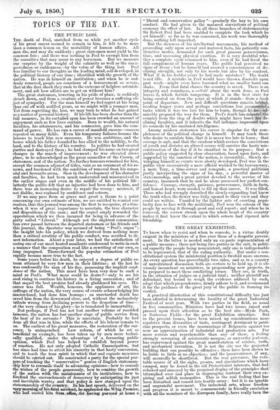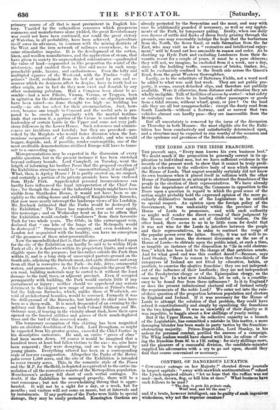THE GREAT EXHIBITION.
To know when to resist and when to concede, is a virtue doubly exigent in the ministers of a free over those of a despotic govern- ment. In the latter is needed only an ex:parte representation of a public measure ; there not being two parties in the suit, in politi- cal capacity the people being nonexistent, only one is indispensable to be represented, that of the ruling authority. But under a con- stitutional system the ministerial position is twofold more onerous. As every question has proverbially two sides, and as in a country of unrestrained discussion both are certain to be held up, it is ob- viously incumbent on ministers in propounding new projects, to be prepared to meet these conflicting issues. They are in truth, in the situation of judges on a judicial trial ; neither plaintiff nor defendant, but bound to weigh the evidence adduced by each, adopt that which preponderates, firmly adhere to it, and recommend it for the guidance of the great jury of the public in framing its verdict.
A practical illustration of this constitutional difficulty has just been afforded in determining the locality of the great Industrial Festival of next year. With two parties in the field, as usual in free communities, Ministers have had two issues raised and pressed upon their attention as to the best site—Hyde Park, or Battersea Fields—for the great Exhibition structure. But in the present issues, have been mixed up considerations more repulsive than diversities of taste, contingent detriment to patri- cian prospects, or even the murmurings of Belgravia against too near an approximation of industrial and productive arts. Far more serious and reprehensible than any of these, a feeling strongly savouring of aristocratic morgue, or unworthy jealousy, has supervened against the great manifestation of science, taste, and mechanical invention. It is not the site nor the projected building that can possibly be offensive ; these have been shown to be liable to little or no objection ; and the inconvenience, if any, will assuredly be shortlived. But the real grievance, the veri- table source of all the sighs, groans, and ejaculations which have escaped, may be found in the old Protectionist interests, that feel rebuked and annoyed by the promised display of the principles that triumphed over and place in disparaging contrast their own ex- piring and selfish monopolies. ¶rhis is the real feeling that has been disturbed and roused into hostile array : but it is an ignoble and ungratefill movement The industrial arts, whose freedom and progress it is meant to commemorate in friendly emulation with all the members of the .European family, haTe realLy been the primary source of all that is most preeminent in English his- tory. Unaided by the exhaustless resources which prosperous cOmmerce and manufactures alone yielded, the great Revolutionary war could not have been continued, nor could the great victory of Waterloo, in all probability, have been achieved. Agriculture itself owes its advances, in common with the mining districts of the West and the iron network of railways everywhere, to the same stimulative impulse. It is the development of the cotton, linen, and woollen manufactures, and the application of steam, that have given to society its unprecedented conveniences—quadrupled the value of land—augmented in like proportion the rental of the aristocracy, and enabled them to live and move in such unap- proachable pride, luxury, and exclusiveness. Even the lofty and multipled squares of the West-end, with the Pimlico "city of palaces" itself, reclaimed from its bed of mud by arts and re- sources which its denizens affect to despise, have in truth had no 'other origin, nor in fact do they now exist and flourish by any other sustaining pabulum. Had a Congress been about to as- semble-z-had a new Pilnitz, Vienna, Verona, or Troppau, been in agitation for the disturbance of the world—no objection might have been raised—no dome thought too high—no building too costly—no site too select for their accommodation. Just, how- ever, because one temple to Concord and the useful arts is pro- posed to be erected in proximity with the martial testimo- nials that environ it, a portion of the Creme is excited under the leadership of certain Lords in the Upper and some not very judi- cious followers in the Lower House. Such references and renunis- tences are invidious and hateful; but they are provoked—pro- voked by the Marplots who would foster disunion when the har- monious cooperation of all classes is desirable, and who would beggar, degrade, and, if possible render contemptible, one of the most creditable demonstrations civilized Europe will have to trans- mit to a succeeding age.
Misrepresentations may be expected in the discussion of every public question, but in the present instance it has been stretched beyond ordinary bounds. Lord Campbell, on Tuesday, went the length of informing his brother Peers that the proposed erection of the Exhibition structure would be "unconstitutional, if not illegal." What, then, is Apsley House ? It is partly erected on, we suspect, and certainly a portion of its private grounds have been enclosed from Hyde Park. Apprehended personal inconveniences can hardly have influenced the legal interpretation of the Chief Jus- tice; for though the dome of the industrial temple might have been visible from Stratheden House, it would not have been so un-
• sightly as the riding-house and stabling of Knightsbridge Barracks, that now more nearly intercept the landscape views of his Lordship. Mr. Roebuck intimated that the Parks would be destroyed by the Exhibition! The Times has repeated, over and over again, this mensonge ; and on Wednesday went so far as to affirm that the Exhibition would exclude " Londoners " from their favourite Park for two whole years. The Globe, in like extravagant vein, declared that "one lobe of the lungs of the Metropolis would be destroyed !" Strangers in the country, and even residents in London not acquainted with the locality, can have no conception -cif the grossness of these misrepresentations. - Now the =embellished fact is, that the piece of ground fixed upon for the site of the Exhibition can hardly be said to be within Hyde Park at all; it is doubtless within its proprietary limits, and a most eligible space for the purpose ; but lies rather outside the Park than within it, and is a long strip of unoccupied pasture-ground on the South side, adjoining the Barrack-moat, and quite distinct and away from all that is recreative in the Park—its ride, drive, ornamental waters, and promenades. As it lies close alongside the great West- ern road, building materials may be carted to it without the least damage to the turf, trees, or adjacent precinct. Even if occupied permanently with building, the Park would sustain little if any curtailment or injury ; neither should we apprehend any serious detriment to the elegant new range of mansions at Prince's Gate ; but the hideous Barracks, which, unlike those at Woolwich, are void of architectural beauties, would be screened. Formerly it was the drill-ground of the Barracks, but latterly its chief uses have been as a sheep-walk. It is much frequented of an evening by the military and their followers; and both Colonel Sibthorp and Mr. 'Osborne may, if touring in the vicinity about dusk, have their eyes opened on the fancied utilities and graces of their much-deplored trees and the turf of this reserved waste.
The temporary occupation of this skirting has been magnified into an absolute desolation of the Park. Lord Brougham, as might be expected from his greater genius, exceeded the Chief Justice in his descriptive caricature. He said, an entire "grove of elms" had been mown down. Of course it would be imagined that a hundred trees at least had fallen victims to the axe : no, nine have been removed ; they were decaying, and are to be replaced by young plants. Everything uttered has been on a corresponding scale of lawyer exaggeration. Altogether the Parks of the Metro- polis cover 1,568 acres, and the site of the Exhibition is intended to cover twenty acres. This, in the romantic style of the Times and the M.P. for Sheffield, is depicted as equivalent to the entire im- molation of all the recreative resorts of the Metropolitanpopulation. Munehausen's archery fell short of such verbal outrages. No doubt, if the Exhibition be managed properly, there will be a vast concourse ; but not the overwhelming throng that is appre- hended. It will not be a sight for a day, or a week, but for months ; and visitors will not come en masse, but at intervals and by instalments. If any portions of the Parks were liable to special damage, they may be easily protected. Kensington Gardens are already protected by the Serpentine and the moat, and may with ease be additionally guarded if necessary, as well as any applot- meats of the Park, by temporary paling. Really, when one daily sees droves of cattle and flocks of sheep freely grazing through the grounds, one may reasonably indulge the hope that the barbarians from the North, the fierce Gaul, or rude Sarmatian from the far East, who may visit us, for a "recreative and intellectual enjoy- ment,"- will be found not less amenable to reason and order. As to shutting up Hyde Park and excluding Londoners from their fa- vourite resort for a couple of years, it must be a pure chimera; they will not, we imagine be excluded from it a week, nor a day, since all the building traffic, conve co of bricks, timber, &o., will be exclusively confined to the uth side across the Queen's Road, from the great Western thoroughfare. Lastly, as to the substitute of Battersea Fields, not a word need be added to what was said last week. They are not public pro- perty, it seems, except detached slips, and therefore not pubhcly available. Were it otherwise, from distance and situation they are wholly ineligible. Talk of facilities of access by waler!--what safety or certainty can there be in landing either passengers or goods from a tidal stream, without wharf, quay, or pier ? On the land side they are all but unapproachable ; except the -dusty road from South Lambeth—without a footway, and so narrow that two vehicles abreast can hardly pass—they are inaccessible from the Metropolis.
But all uncertainty is removed by the issue of the discussion on Thursday in both Houses: the most eligible site for the Exhi- bition has been conclusively and satisfactorily determined upon, and a structure may be expected to rise worthy of the occasion and of the opulence and greatness of the British community.



























 Previous page
Previous page